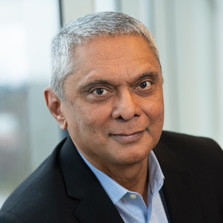
2023 was undoubtedly the year that AI barnstormed our tech consciousness. Trained on massive amounts of public data; AI generated cool new images, wrote up content summaries, and delivered seemingly original work in the blink of an eye. Could this also be the future of helping companies balance the need for sustainable, green innovation against resource and supply chain constraints?
Artificial intelligence offers promise for accelerating materials/formulation R&D. But AI for science needs to be uniquely focused, applying small, curated use-case AI models mapping to multiple scientific principals at a time, to speed scientific discovery. This has the potential to be a game-changer across a wide range of fields, including medicine, agriculture, engineering and more, which is why Sunil believes that 2024 will be the year for specialized AI.
Sunil Sanghavi is currently CEO of NobleAI, a pioneer in Science-based AI solutions for chemical and material informatics. He has a rich and diverse operating background in deep-tech companies over 40 years. Most recently, he was Senior Investment Director at Intel Capital, where he invested in AI/ML hardware and software companies including Motivo, Untether AI, Syntiant, and Kyndi. He attended the MSc Chemistry program at the Indian Institute of Technology Bombay and obtained a BSEE from Cal Poly, San Luis Obispo.
M.R. Rangaswami: You have an impressive resume leading a variety of companies. What led you to NobleAI at this time?
Sunil Sanghavi: Generative AI dominated the discussion in 2023, and will certainly continue to be a fascinating area to watch. At this point most people have experimented with the many available LLM-based tools and understand how they can help us with everyday tasks. But what I find most exciting is the opportunity to apply AI to speed scientific discovery. Science based AI (SBAI) has the potential to be a game-changer across a wide range of fields, including chemistry, materials, energy and many others to speed scientific discovery.
That area is very exciting to me and is what drew me to NobleAI, where we’re showing the power of Science-Based AI (SBAI) to help companies achieve their goals. As opposed to large language models (LLMs), which is what GenAI is (basically scraping massive amounts of publicly available data), SBAI uses SSMs or Smaller Science-infused models where we apply the power of AI to private, industry- or company-specific data sets, and add to that applicable scientific laws and any available simulation data. This elegant process presents incredible opportunities for advancements to develop or improve chemicals, materials and formulations while also tackling pressing issues for companies like cost, supply chain and customer satisfaction. And unlike LLM-based solutions, SBAI is an optimized ensemble of models, optimized for each specific use case. Our ability to do this for literally hundreds of use cases in 3 or so person-months each and at a deterministic cost is what allows us to offer customized solutions while being able to scale NobleAI’s business.
M.R.: What are the challenges to innovation using SBAI?
Sunil: As is the case with any technological advances, it’s a change in mindset which will be the most immediate challenge. Scientists and researchers are trained to advance or eliminate solutions based on empirical experimentation. This can be cost-prohibitive, and is always by its nature time-consuming and limited in scope. In fact, research into chemical and specialized materials … an industry that spends $ 100 billion per year on R&D … has not experienced much innovation in the past 50 years for this very reason. Developing chemicals and materials is incredibly complex, often requiring experimentation across a multitude of parameters so that researchers can understand interactions of hundreds of different ingredients interacting at scales ranging from molecular to formulations. But now, AI for science is opening the door to a better approach and NobleAI is leading the charge. The goal is to use AI to more rapidly explore a greater range of chemicals and materials in software (i.e., before going to the lab) saving potentially months or even years of R&D time.
M.R.: Where do you see this really taking off first? What are the emerging trends that are most exciting?
Sunil: To me the most exciting possibilities are in the area of sustainability. There’s a big push to improve the safety of material ingredients for both the environment and human health. For instance, more people, organizations and regulators are now talking about the need to replace forever chemicals. But anytime there’s a need to replace an ingredient it can be a real challenge for companies to find substitutes. That’s why you often see the knee jerk reaction to fight a new environmental regulation. But the great thing about Science -Based AI is that we can turn that around. We can support companies and get behind sustainability initiatives. SBAI can not only help companies stay ahead of the shifting regulatory environment but we can support companies to get behind sustainability initiatives. I call what we do “Good AI, For Good”.
M.R. Rangaswami is the Co-Founder of Sandhill.com
